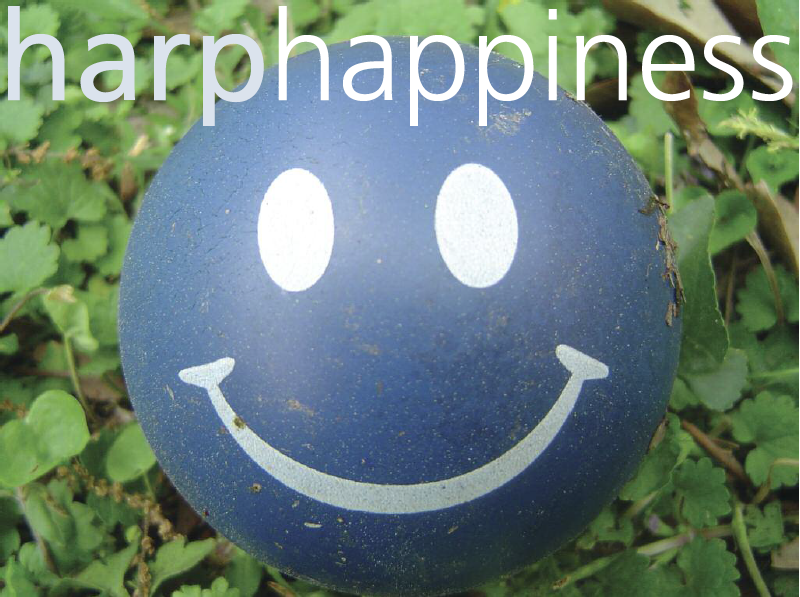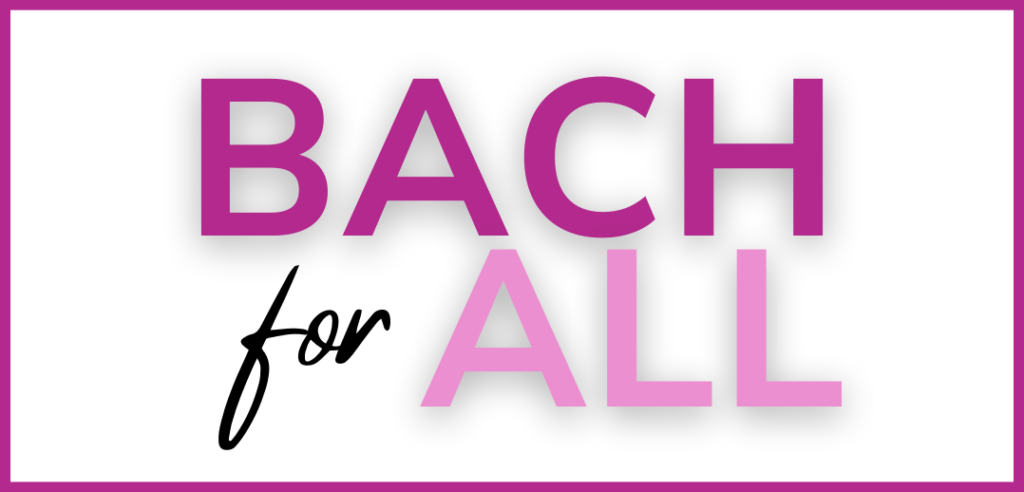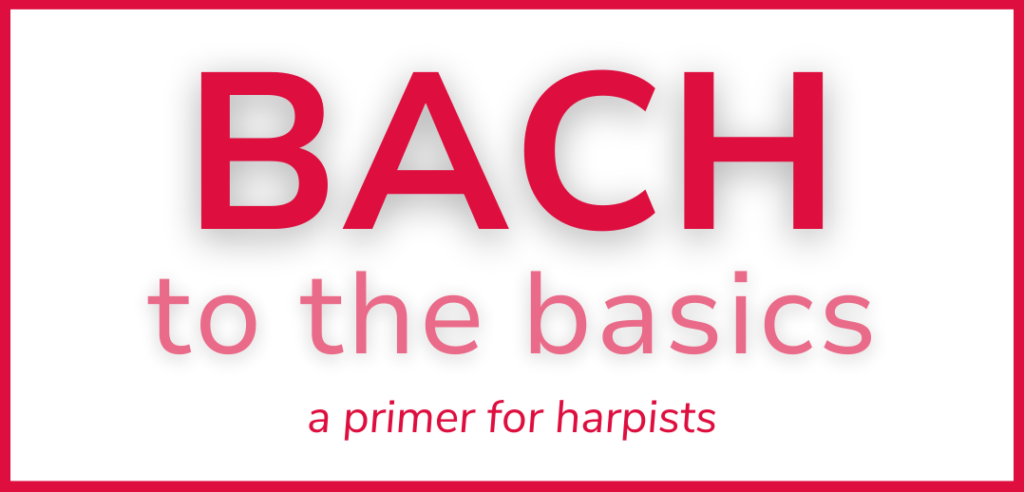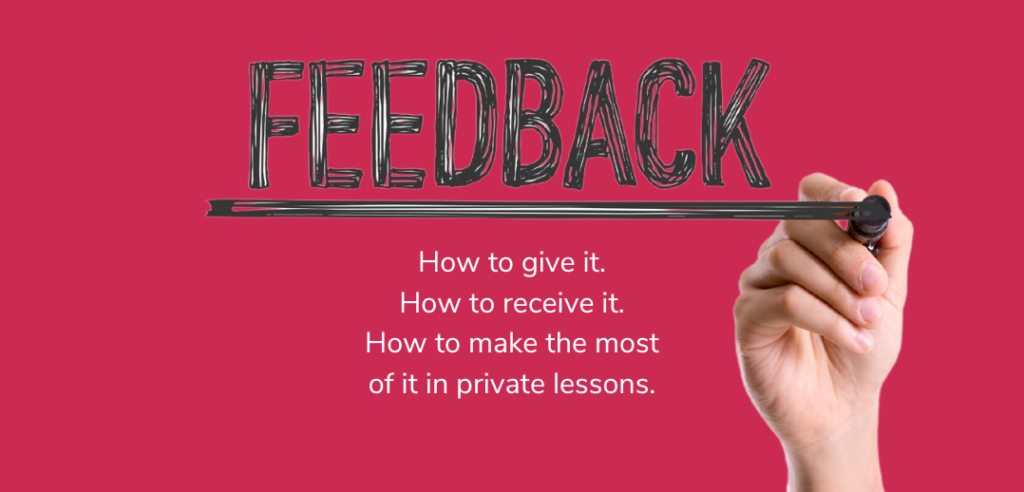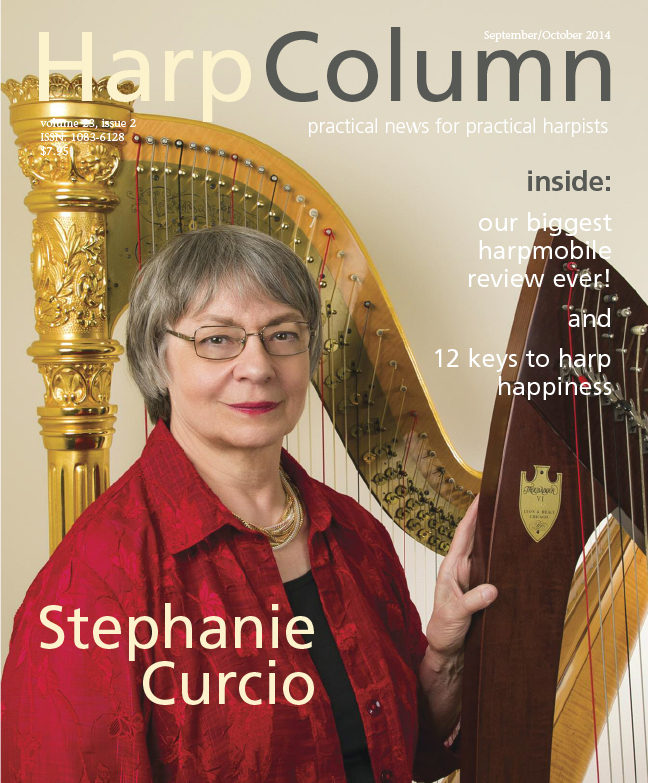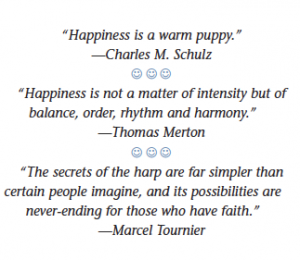
For me, and probably for you too, happiness is closely related to harp-iness. I have loved the harp since I was little. I love the instrument itself, with its graceful appearance and its warm, liquid sound. I love harp music, whether I’m playing or listening, and I am energized when I am around others who feel the same way.
Sometimes, though, I meet a harpist who has lost that lovin’ feeling. Maybe it’s a student who is stuck and beginning to despair of ever playing the way she wants. Perhaps it’s a professional harpist who is so weighed down by career demands that she doesn’t have the energy to renew her relationship with the harp.
The harp is a demanding instrument, and we all can feel discouraged, disillusioned, or just plain tired from time to time. Whenever I need to adjust my attitude, I run through a 12-point checklist. These 12 points are habits I consider essential to harp happiness. Making sure that I have all of these habits in place is the best way I know to get back on track and start enjoying making music on the harp.
There are so many things we can’t control in our performance. Our level of happiness depends on our ability to accept the bad and the good.
All of these habits are important. Skipping one of them is like driving on a flat tire; you might still get where you’re going, but the ride will be slow and bumpy. The first six habits all relate to practicing and your personal relationship with the harp. The last six are all about playing and stepping outside your practice room. Whether you’ve been playing for four months or four decades, these habits will keep your harp spirits high.
1. Create space.
You need to have physical and mental space to dedicate to the harp. Making music, especially on the harp, isn’t something you can do in between errands or in a spare couple of minutes. It requires time and focus. Clear out the clutter from your practice room, your schedule and your mind so you can concentrate.
2. Develop a habit.
Playing and practicing the harp need to be reliable parts of your daily routine. I always feel better knowing that I have set aside a block of time to practice. Try practicing at the same time of day, in the morning if you are a morning person or late in the evening if you are more of a night owl. Also, working in a little “pre-practice” ritual can give you extra motivation. Having a cup of tea or doing a short series of stretching exercises can help get you in the mood to focus on your work.
3. Set goals.
Even if you don’t have a performance scheduled on your calendar, you should always have daily, weekly, and longer-term goals to give your playing a focus. A goal is an achievable and measurable objective, like playing a piece at tempo, for instance. If you don’t have a goal in mind for your practice session, your work will be less productive and less interesting. Look at it this way: without a destination, how will you know when you get there?
4. Do complete practice.
Every practice session should include work in three crucial areas: technique, musicianship, and repertoire. Practicing pieces is only one part of a complete practice routine. Are you doing your scales and exercises every day? Are you also practicing sightreading or reviewing note reading or rhythm skills? Technique and musicianship skills are essential tools for any musician, and they require development and regular maintenance.
5. Involve your brain in your practice.
Mindless practice is probably the most useless way to use your valuable practice time. Make sure you focus on specific practice techniques and tasks that will lead you to achieving your goals. Always focus on why you are practicing, not merely on what. Be particularly careful not to rely on repetition to achieve results that are better obtained by more musically engaging means.
6. Connect with other harpists.
Get out of your practice room and find some harp friends who are as excited and passionate about the harp as you are. Just hang out and talk about harp stuff, maybe over a cup of tea or a glass of wine.
7. Play, don’t just practice.
My teacher told me that it was Salzedo’s habit to play through his concert repertoire every Sunday. Practice was for the other days; Sunday was for playing and repertoire review. If you are stuck in permanent practice mode, this can make a huge change in your mindset. Devote one day a week to playing, not practicing. Play through old pieces, or read through new ones. Don’t stop to correct yourself. I know it sounds radical, but just play for your own pleasure.
8. Practice performing.
We all know how concerts bring out the sweaty palms and shaky fingers. Do you know that you can practice performing without an audience? Try dressing up and playing for your favorite cat, dog, or hamster. Treat it like a performance: no stopping, no talking. You should even practice walking to the harp and bowing. You can also record yourself. You don’t even have to listen to the recording. Just practicing playing with a little added pressure can help reduce your jitters when you are in front of the actual audience.
9. Develop a personal repertoire.
It is an inescapable fact that you will be asked to play for someone some day. Whether it’s a relative who wants you to play for a special occasion, or a house guest who is curious about the harp, you need to have a piece or two that you can sit down and play without fuss or worry. These pieces can be the easiest pieces you know. Simply keep them fresh by playing them once a week (see habit 7), and you’ll always be able to oblige a request. Even more important is the confidence that you will feel when you have a piece of music you can play well.
10. Play with other musicians regularly.
This is a great way to step into public performance. By playing with friends in a casual, friendly environment, you will gain experience and confidence. You can join a local harp circle, if there is one in your area; you will find a lot of support and encouragement there. Or you can join or host an informal music get together where all instruments are welcome. Just making music with others will rejuvenate and inspire you.
11. Practice acceptance.
There are so many things we can’t control in our performance. Our level of happiness depends on our ability to accept the bad and the good. Accept the imperfections in your performance, and understand that it can bring pleasure to a listener anyway. Accept your fear or nervousness; it’s a natural physical reaction, but you don’t have to let it stop you. Accept the contributions and efforts of other harpists. Accept yourself and your playing as where you are today, and realize that this need not be a permanent condition.
12. Practice enjoyment.
Remember to enjoy this wonderful gift of music. Every time you play, find one thing that you love and acknowledge it. It may be a beautiful sound, a lush chord, a soulful melody. And each day acknowledge yourself for something you have done well, improved, or discovered. Look for those little things that can be so meaningful, like a student’s smile after you give a well-deserved compliment or the feel of playing a surprisingly even-sounding chord. Celebrate the moments; they’re what the music is all about. •






